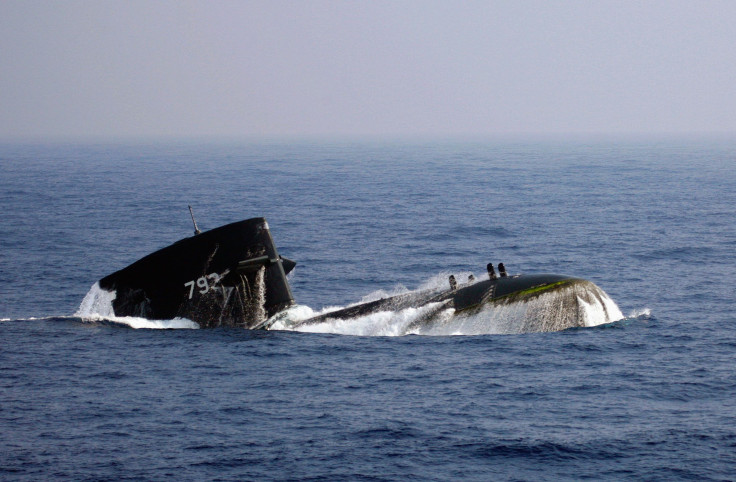Taiwan Announces Plans For New Submarines Week After Ship Launch

A week after launching its first domestically-built missile warship, Taiwan has announced a project to build its own submarines. The move comes after decades of failed attempts to procure submarines from the United States and reflects tensions between mainland China and South China Sea countries over territorial disputes.
Taiwan is eager to expand its capabilities as a way to remain relevant as mainland China also rapidly develops its own military, according to national security experts. “It’s part of Taiwan’s military strategy to have a presence in the Taiwan Straits,” Richard Bush, director for the Brookings Institute Center for East Asia Policy Studies, said. “One of the ways of preserving that capability is by modernizing its military.”
Taiwan announced in September a major 20-year plan to modernize its aging fleets of ships and equipment. Taiwan's Deputy Defense Minister Chiu Kuo-cheng told parliament Tuesday that the government had approved guidelines for the design contract for the new defense submarines. "This means the military has officially kicked off the self-built submarine project," Lin Yu-fang, a parliament defense committee member, said in a statement.
Preparatory work for the project will begin in 2015, with an approved budget of NT$10 million (US$315,560.) Work on the design is slated in 2016 with a budget of NT$3 million (US$94,580). The project is contracted to take four years. While the final design hasn't been released yet, vice admiral Hsiao Wei-min said in the parliament session that "at present the navy's demand is submarines ranging from 1,200-3,000 tons." The new submarines will replace Taiwan’s four current submarines, two of which date to World War II.
Mainland China has been blamed for increasing tension and conflict in the South China Sea amid territorial disputes over the Spratly Islands. However, some believe that Beijing is not overly concerned with Taiwan’s efforts to modernize its navy.
“Whenever any country makes any attempt to defend themselves,” Christopher Preble, vice president for defense and foreign policy studies at the Cato Institute said, “there’s always the risk that other neighbors can certainly interpret that a sign of aggression.” But he said that Taiwan’s move was probably necessary. “What’s the alternative to defending themselves? Not defending themselves?” Preble said, adding that Taiwan's modernizing attempts are "modest" at best.
China's international prowess has made it especially difficult for Taiwan to rely on foreign assistance. “It can be internationally challenging for any country to sell Taiwan anything,” Eric Wertheim, author of the Naval Institute Guide to Combat Fleets of the World, said. “Germany, the Netherlands, Sweden, and South Korea are the other countries that do build diesel submarines, but they’re not willing to risk angering China by selling them to Taiwan.”
Under the 1979 Taiwan Relations Act, Washington is committed to Taiwan’s self-defense. But Taiwan’s deal with Washington to acquire eight diesel submarines in 2001 fell through after then-President Chen Shui-bian soured U.S.-Taiwan relations. “Chen Shui-bian was drafting initiatives back then that was suggesting to China that Taiwan was moving toward being fully independent,” Bush said. “Chen didn’t consult with [the Bush administration] when he made those initiatives, and if Beijing responded, the U.S. would have to get involved.”
Ever since the two sides split in 1949, Beijing has considered Taiwan a renegade territory and has refused to rule out the use of force to reclaim it. Relations between mainland China and Taiwan warmed considerably once current president Ma Ying-jeou took office in 2008. Mainland China is now Taiwan’s largest trading partner. However, Ma recently stepped down as the chairman of the Beijing-friendly Kuomintang party after disastrous local elections.
While only a handful of countries in Southeast Asia currently have submarine capabilities, there’s been a dramatic increase in submarines in the past five years, and will be for the next five years, too, Wertheim said. Submarines are invisible to radar, are very good at collecting intelligence and are crucial to hunting down other submarines.
Taiwan’s new Tuo Chiang-class missile ship has been lauded as probably the fastest in the region. Taiwan is also acquiring new missile systems and is expected to receive two retired frigates from the U.S. Navy, in addition to anti-submarine aircraft. But the island’s investment in building submarines is particularly crucial. “Even one submarine can change the whole dynamic of warfare,” Wertheim said.
© Copyright IBTimes 2024. All rights reserved.






















